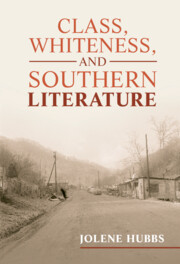
-
Select format
-
- Publisher:
- Cambridge University Press
- Publication date:
- December 2022
- December 2022
- ISBN:
- 9781009250627
- 9781009250658
- 9781009250641
- Dimensions:
- (229 x 152 mm)
- Weight & Pages:
- 0.46kg, 206 Pages
- Dimensions:
- (229 x 152 mm)
- Weight & Pages:
- 0.342kg, 206 Pages
- Series:
- Cambridge Studies in American Literature and Culture (190)
- Subjects:
- Literature, Area Studies, American Literature, American Studies, Literary Theory
You may already have access via personal or institutional login- Series:
- Cambridge Studies in American Literature and Culture (190)
- Subjects:
- Literature, Area Studies, American Literature, American Studies, Literary Theory
Book description
Class, Whiteness, and Southern Literature explores the role that representations of poor white people play in shaping both middle-class American identity and major American literary movements and genres across the long twentieth century. Jolene Hubbs reveals that, more often than not, poor white characters imagined by middle-class writers embody what better-off people are anxious to distance themselves from in a given moment. Poor white southerners are cast as social climbers during the status-conscious Gilded Age, country rubes in the modern era, racist obstacles to progress during the civil rights struggle, and junk food devotees in the health-conscious 1990s. Hubbs illuminates how Charles Chesnutt, William Faulkner, Flannery O'Connor, Dorothy Allison, and Barbara Robinette Moss swam against these tides, pioneering formal innovations with an eye to representing poor white characters in new ways.
Contents
Metrics
Altmetric attention score
Full text views
Full text views help Loading metrics...
Loading metrics...
* Views captured on Cambridge Core between #date#. This data will be updated every 24 hours.
Usage data cannot currently be displayed.
Accessibility standard: Unknown
Why this information is here
This section outlines the accessibility features of this content - including support for screen readers, full keyboard navigation and high-contrast display options. This may not be relevant for you.
Accessibility Information
Accessibility compliance for the PDF of this book is currently unknown and may be updated in the future.


